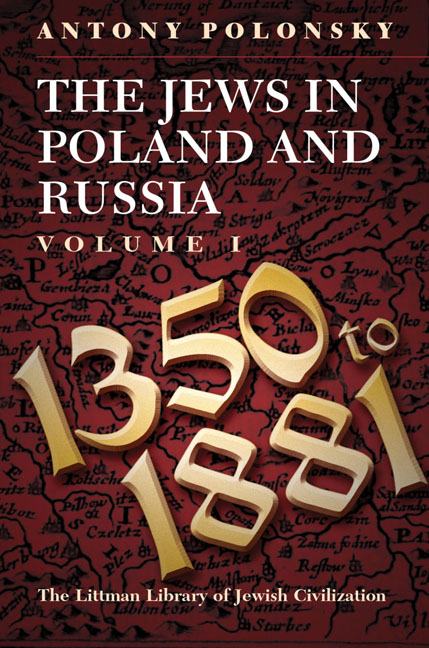Book contents
- Frontmatter
- Dedication
- Acknowledgements
- Contents
- List of Maps
- List of Tables
- Note on Transliteration
- Note on Place Names
- Maps
- General Introduction
- PART I JEWISH LIFE IN POLAND–LITHUANIA TO 1750
- PART II ATTEMPTS TO TRANSFORM AND INTEGRATE THE JEWS, AND THE JEWISH RESPONSE, 1750–1880
- Glossary
- Bibliography
- Index
11 - Nicholas I and the Jews of Russia, 1825–1855
- Frontmatter
- Dedication
- Acknowledgements
- Contents
- List of Maps
- List of Tables
- Note on Transliteration
- Note on Place Names
- Maps
- General Introduction
- PART I JEWISH LIFE IN POLAND–LITHUANIA TO 1750
- PART II ATTEMPTS TO TRANSFORM AND INTEGRATE THE JEWS, AND THE JEWISH RESPONSE, 1750–1880
- Glossary
- Bibliography
- Index
Summary
You wrongly reproach me
For opposing union with you;
You yourselves are to blame
For the sinful rupture of fraternal ties …
I do not excuse my prejudices,
I am ready to improve myself,
But I recognize a hostile voice
No matter how sweet it sounds …
It is time to abandon these quarrels
And hateful words.
You should better turn
Your attention to my rights;
Then you yourselves will see
That I am in no way worse than you.
REUBEN KULISHER, 1849NICHOLAS I AND THE JEWS
NICHOLAS I has an unenviable reputation. By most historians of Russia he is seen as unimaginative, chauvinist, militaristic, and repressive, a man whose reign was characterized by thirty years of stagnation, the gloom of which was only alleviated by a literary flowering which he did his best to suppress. According to one of them, his reign was the ‘apogee of autocracy’. In Jewish eyes, he was a man motivated by the most primitive anti-Judaism, and initiated the heartless conscription of Jewish children. In the words of the Yiddish folk song:
Az Nikolai Pavlovich iz keyzer gevorn
Zaynen yidishe hertser umetik gevorn.
When Nikolay Pavlovich became tsar,
Jewish hearts grew sad.
There is considerable truth in these judgements. According to Michael Stanislawski: ‘To Nicholas, the Jews were an anarchic, cowardly, parasitic people, damned perpetually because of their deicide and heresy; they were best dealt with by repression, persecution, and, if possible, conversion.’ At the same time, Nicholas was in some ways the last of the enlightened despots. A leading scholar of the period, while conceding the all-pervasive étatism and bureaucratic centralization which characterized his rule, has also argued that this was a time of ‘prereforms’ which paved the way for the changes introduced by Alexander II. Nicholas was determined to reorganize and systematize the administration of his empire and transform it into a ‘properly governed state’ of the sort desired by eighteenth-century enlightened autocrats. His goal was to establish effective methods of state administration and control which would unify his multi-confessional and ethnically diverse empire. As a consequence, his reforms were characterized by the creation of new administrative agencies and the reform and centralization of existing ones. Through them he aimed to rebuild and control the state's infrastructure from above.
- Type
- Chapter
- Information
- The Jews in Poland and RussiaVolume I: 1350 to 1881, pp. 355 - 391Publisher: Liverpool University PressPrint publication year: 2009

